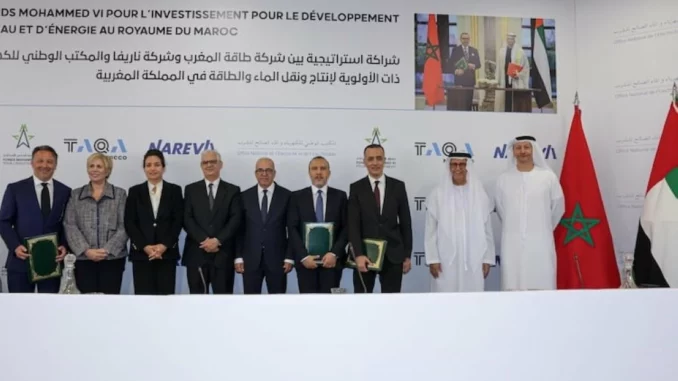
A Moroccan-Emirati consortium, including the Mohammed VI Investment Fund, TAQA Morocco—part of Abu Dhabi’s TAQA Group—and NAREVA, has signed three memoranda of understanding with the Moroccan government and the state utility ONEE to develop large-scale water and energy infrastructure.
The agreements, sealed under a declaration signed by King Mohammed VI and UAE President Sheikh Mohammed bin Zayed Al Nahyan in December 2023, cover critical projects in desalination, electricity generation and transmission, and water transfer systems.
The program aims to address Morocco’s pressing water scarcity and energy demands, while advancing the country’s long-term goals of energy independence and climate resilience.
The proposed investments include water transfer, through the construction of a new waterway that will connect the Sebou and Oum Rabia river basins, with an annual capacity of 800 million cubic meters. The project addresses growing water scarcity, according to statements by ONEE and TAQA.
The deals also include building five seawater desalination plants in regions including the Oriental, Tangier-Tetouan-Al Hoceima, Souss-Massa, Guelmim, and Tan-Tan. The plants will have a combined capacity of 900 million cubic meters annually and will be powered entirely by renewable energy.
The partners also teamed up to build a 1400-kilometre high-voltage direct current (HVDC) line, connecting the southern provinces to central Morocco, with a transmission capacity of 3,000 MW. The line is intended to accelerate the integration of renewable energy from the Sahara into the national grid.
Concerning renewable energy development, the consortium will add 1,200 MW of new capacity, primarily wind and solar, with projects spanning from Boujdour to Dakhla.
They will also develop a 1,500 MW combined-cycle gas power plant at Tahaddart in northwestern Morocco to enhance grid stability.
The consortium will structure and secure financing from both domestic and international institutions. ONEE said the projects will be implemented under individual development agreements, the first of which—covering the Tahaddart gas plant—has already been signed. All projects are subject to regulatory approvals.
The program is expected to generate over 25,000 jobs during construction and operation, including more than 10,000 permanent positions. Officials say it will also foster technology transfer, support the emergence of a local industrial ecosystem in desalination and renewables, and spur regional development through improved infrastructure and rural electrification.
The initiative is expected to generate over 25,000 jobs, including 10,000 permanent one, and foster a local industrial base in desalination and renewable technologies. It also aims to spur workforce training and technology transfer.
Framed as a transformational public-private partnership, the program underscores Morocco’s ambition to secure critical resources, attract foreign investment, and position itself as a regional leader in sustainable infrastructure.
